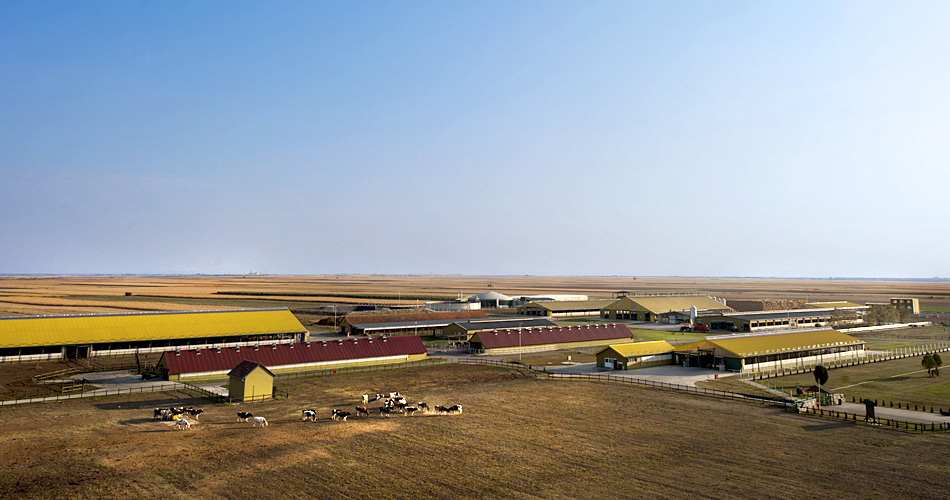
Global Seed is a company with production facilities in the central Vojvodina region, which is an area with exceptional potential and resources for organic farming.
Our site on the fertile Vojvodina plains more than 2,000 hectares in size is where we grow organic crops and rear organic cattle, manufacture organic feeds for ruminant livestock, produce renewable energy and care for the health and welfare of animals.
At Global Seed we are dedicated to caring for our employees, building good partnerships with consumers and suppliers, constantly improving our know-how and technologies, to animal welfare, to environmental protection and to creating profit through the use of modern production and management technologies.
Our mission is to create modern consumers of organic products, to teach them what organic products are, how to recognise them, why they are important for the well-being of their body, how they can make a connection with nature and how they can best contribute to its preservation.
Our vision is to become a regional leader in the production of organic milk, meat and organic cattle feed as the largest organic cow farm in Europe.
In cooperation with the Imlek company organic milk produced on our farm in Čurug is processed into a range of high-quality organic dairy products. In this way we have fulfilled our task and taken raw materials to finished product.
To achieve everything we have planned we need to invest time, know-how, a great deal of work – as well as the determination that we have so much of. 140 employees and a great number of seasonal workers are helping us to realise our goals.
That, in short, is who we are.
Welcome to the world of organic farming.
Saša Vitošević
CEO
Our products bear the symbols of the following quality control systems
We have established a quality management system that conforms to the requirements of SRPS ISO 9001:2008, together with a food safety management system that is in line with Codex Alimentarius CAC/RCP 1-1969, Rev.4 – 2003 and EEUOPPSTC (Equivalent European Union Organic Production and Processing Standard for Third Countries).
These systems are integrated and instruments are built into them such as process documents, internal verification, management review, data analysis, and corrective and preventive measures that ensure ongoing improvements to the effectiveness of the entire quality system.
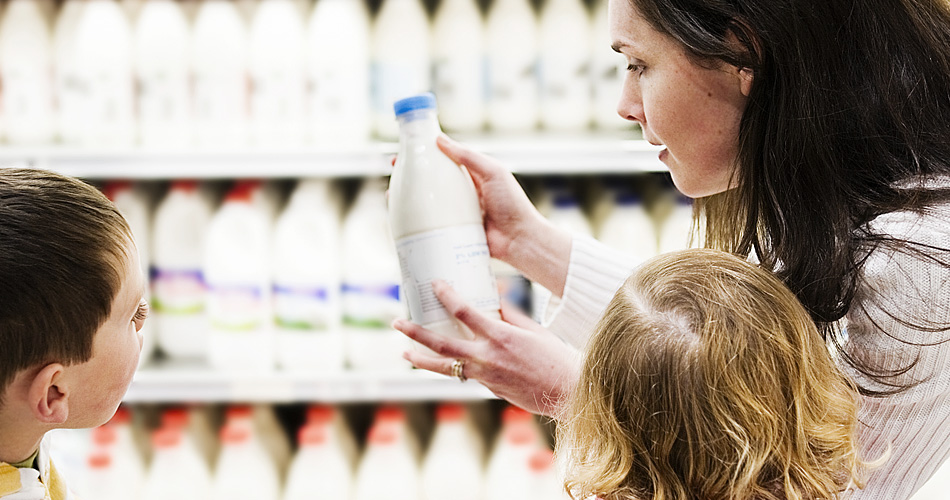
The food safety management system ensures:
When the consumer sees a symbol on a product indicating that the HACCP system has been implemented in its production, they know that the food product they are holding in their hands is safe for human health and is contributing to a reduction in the incidence of food-related illness.
The ISO 9001:2008 certificate is the only internationally-recognised proof of quality issued by an independent international certifying body.
Implementation of a quality management system has great strategic importance for all aspects of a business. In this respect, the ISO 9001:2008 standard is applicable to all organisations, independent of type, size, products or services, and is the only one that can be used for the certification of management in the business world.
The process of certification and monitoring is carried out under the supervision of the highly respected certification body OCS, while certification and monitoring to EU standards is conducted in association with CERES, the local authorised office.
Any producer wishing to declare their product as organic and to market it as such needs a certificate proving the organic origins of the product.
The certificate guarantees to the consumer that the manufacturing process of the agricultural or food product is controlled from the moment that the production unit (plot of land, holding, farm, etc.) is brought into the organic farming process to the moment when the product is sent to market.
Farms and food producers holding an organic certificate produce food of greater biological value and under strictly controlled conditions. The biological value of food is determined by the growing method itself, the choice of species and variety or breed, and the growth and development that takes place in an environment that is as close to the natural one as possible. In other words, it is food production without the use of pesticides, that is, excluding the use of herbicides, insecticides, fungicides, rodenticides, antibiotics, hormones and other synthetic and chemical substances.
The first stage of certification of a farm requires that the soil be prepared, meaning that prohibited substances (synthetic agents etc.) have not been used for a specified number of years. Conventional agricultural land goes through a two- to three-year conversion period in order to fulfil the conditions for organic agricultural production to commence. Food produced during this period is not considered fully organic, but it is on the road to becoming organic, and bears the legend “Product under conversion to organic farming”.
Main conditions for obtaining a certificate
The certification process
Once a farm has taken the decision to go organic, it must take the following steps:
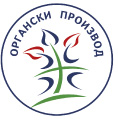
By way of confirmation that the farm is certified, that is, organic farming methods have been implemented in accordance with Serbian regulations, the producer receives a certificate from an accredited certification body and the right to label the product with the legend Organic Produce and the national symbol as well as permission to add the code and logo of the certification body in question.
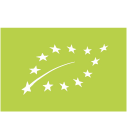
By way of confirmation that the farm is certified, that is, organic farming methods have been implemented in accordance with European Union regulations, the producer receives a certificate from an accredited certification body and the right to label the product with the legend Organic Produce and the national symbol as well as permission to add the code and logo of the certification body in question.
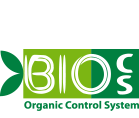
The certificate includes: the name, address and code number of the certifying body; the address or registered office of the producer; the type of organic product and its estimated annual production volume; the serial number of the certificate; the stamp of the certifying body and the signature of an authorised representative of that organisation.
The organic product declaration states the name of the producer or importer, the country of origin, the year of production, the shelf life of the product, the serial number and date of issue of the certificate and, in the case of foodstuffs, all ingredients in descending order by weight, any additives and processing methods used in production.
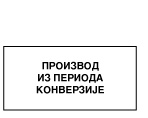
products produced in the conversion period may be sold provided their production process has been inspected by an accredited certifying body and they are labelled with the legend “Product under conversion to organic farming”, the name and logo of the authorised certifying body, but not the national symbol.
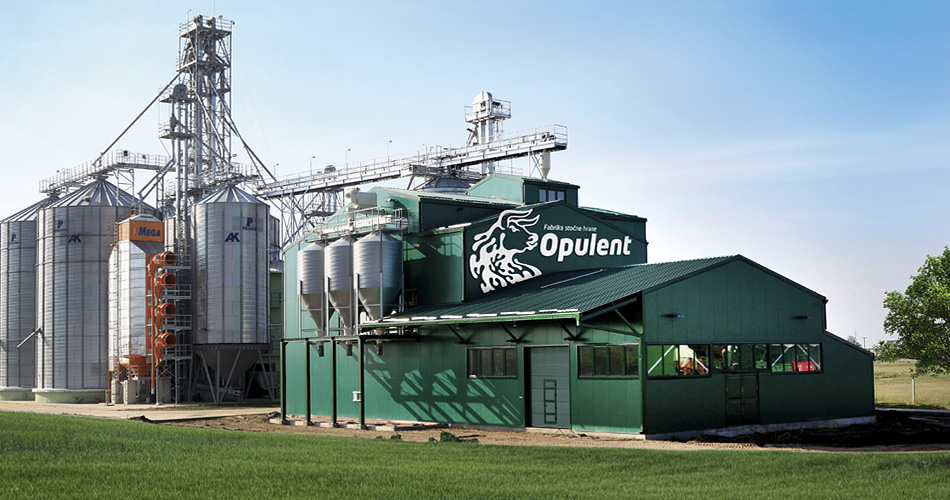
In order to begin organic cattle farming, animals need to be provided with pasture or organic feed produced on the same holding or from holdings in the region, provided that these are certified by an authorised certification body.
This was one of the primary reasons why we decided to invest in the construction of our own organic cattle feed factory under the Opulent brand.
Opulent is the first cattle feed factory in the region specialising in the production of organic cattle feed and concentrated organic feed.
It was designed based on technology from the Dutch company Ottevanger, a European leader in the field.
The Opulent factory features specialised lines for:
The mixtures in the Opulent range have been composed in cooperation with distinguished experts at the Novi Sad Faculty of Agriculture Animal Science Department.
The Opulent factory in particular focuses on the process of steam flaking, technologically-speaking the latest technique for processing grain for feeding ruminants of all species. Opulent currently produces corn, oat, barley and wheat steam flakes.
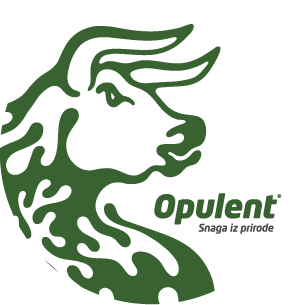
The factory has been designed with sufficient capacity to meet the needs of our own farm and additionally supply some 30,000 tons of concentrated organic feed for ruminant livestock to the market annually.
Opulent offers the option of producing organic feed mixes to special order of its customers, consulting services by Opulent’s nutritionists, bin silo installation and distribution of our product loose or in packages of 40, 50, 500 and 1,000 kg.
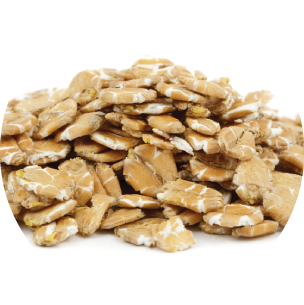
![]()
Products for calves
![]()
Products for heifers
![]()
Products for beef
![]()
Products for milking cows and dry cows
![]()
Products from the steam flaking line
![]()
Products from the extrusion and pressing lines
Contact:
Fabrika stočne hrane Opulent
Gospođinačka 1a
21238 Čurug
SERBIA
Tel: +381.21.4804.348
Fax: +381.21.833.039
Mob: +381.63.1074.586
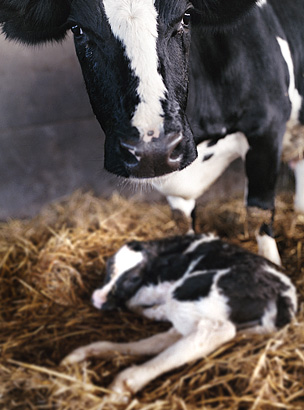
Jegrička d.o.o. Veterinary Centre bases its operation on the principles of good veterinary practice, where expertise, attention to detail and care for the welfare of animals are at the forefront.
The centre employs veterinarians and technicians with many years of professional experience in the veterinary field. This ensures greater productivity and better economy for cattle farming, better health and reproduction in the livestock and helps protect human health.
The staff of the Jegrička Veterinary Centre spend most of their working hours on our farm and this is one of the main reasons why our vets and technicians have been trained in the principles of organic cattle farming.
One of their primary tasks, in cooperation with the staff on our cow farm, is disease prevention, which is a lynchpin of successful organic cattle farming.
Disease prevention in organic production is founded on:
The Jegrička Veterinary Centre also provides the following regular services:

Contact: |
Director: Radoslav Reljić |
Member companies of Global Seed Business System:
Ripe fruit farm - Fruit Production and Storage Company
Opulent - Cattle Feed Factory
IFOAM - International Federation of Organic Agriculture Movements
ISOFAR - International Society of Organic Agriculture Research
Serbia organica - The National Association for Organic Production
The Serbian Milk Producers’ Association
The Serbian Holstein Association
The Centre for Organic Production
IAE - The International Energy Agency
COGEN - The European Association for the Promotion of Cogeneration
Soil Association - campaigning for healthy, humane and sustainable food, agriculture and soil use
IMLEK - Milk and dairy products

Facebook-u